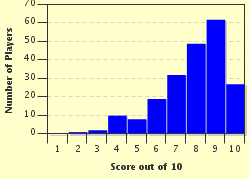Quiz Answer Key and Fun Facts
1. In order to create a "better-than-fair" science fair project, the student must follow the scientific method.
2. Which of these subjects would provide a good topic for the "better-than-fair" science fair project?
3. What of the following would be the best first step for the "better-than-fair" science fair project?
4. After completing the background research for the "better-than-fair" science fair project, it is time to construct an educated guess as to the outcome of the experiment. In the field of science, what is this educated guess is called?
5. As work is completed on the "better-than-fair" science fair experiment, it is important to keep a lab notebook or log of everything that is done.
6. When working on the "better-than-fair" science fair experiment, after having made an educated guess as to the outcome, what is the next step?
7. When testing an educated guess on the "better-than-fair" science fair project, the scientist will be looking for a cause and effect relationship. The experiment will be designed so that one item that changes may cause something else to change in a predictable way. The changing quantities are called variables. Which variable(s) is/are changed by the scientist conducting the experiment?
8. When testing an educated guess on the "better-than-fair" science fair project, the scientist will be looking for a cause and effect relationship. The experiment will be designed so that one item that changes may cause something else to change in a predictable way. The changing quantities are called variables. Which variable(s) is the scientist careful to always keep constant?
9. If the "better-than-fair" science fair project requires a survey, from the choices listed below, how many people should be consulted to obtain the most accurate result?
10. The "better-than-fair" science fair project is a failure if the educated guess is proven false.
Source: Author
ponycargirl
This quiz was reviewed by FunTrivia editor
CellarDoor before going online.
Any errors found in FunTrivia content are routinely corrected through our feedback system.


